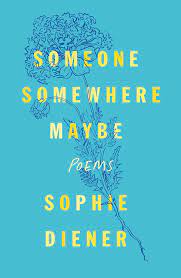by Nicole Yurcaba

Sophie Diener’s Someone Somewhere Maybe, published by St. Martin’s, bears an interesting blurb on its back cover–”For fans of Rupi Kaur, Cleo Wade, and Amanda Lovelace.” However, the blurb does a disservice to Kaur by likening Diener’s poems to Kaur’s. Why? The bulk of Kaur’s poems draw attention to social issues and women’s issues, and while, despite their simplicity, Kaur’s poems possess at least a little bit of intellectual, even philosophical, depth. Thus, Diener’s poems, and more specifically her collection Someone Somewhere Maybe stand in sharp contrast to Kaur’s. Quite frankly, the book possesses one redeeming poem–the very last one, and by that point, readers are practically screaming, “Thank God this is over!”
The collection opens with “Haunted House,” a song that rhymes and rolls like a scrapped Taylor Swift song. At the same time it attempts to be serious, it also waxes mercilessly cutesy. The rhyming does not at all help matters. For example, consider the first stanza’s most, er, accessible lines: “And Jake says it’s haunted,/ but I think he lied. / Still we won’t risk it; / we don’t go inside.” Well, with insights like that, the haunted house is very grateful the speaker and their accomplice did not enter. The travesty continues in the second stanza, when the speaker attempts to make an astute observation: “And I’ve never noticed, but your eyes are so green.” The poem concludes (thankfully) when the speaker’s mother informs them that the house has been sold, and the buyer happens to be the speaker’s former crush. This is apparently earth-shattering news, because the speaker surmises, “and I think maybe Jake was right / when he told me that old house / was haunted.” If readers make it a few more poems into the collection, nonetheless, they discover “A Heart with Legs,” which makes “Haunted House” look like one of TS Eliot’s masterpieces.
If one does not conjure the image of a plastic red heart with flexible pink arms and legs when they read the title “A Heart with Legs,” then one obviously has no imagination or overexposure to WalMart’s Valentine’s Day aisle. However, this poem reads as though it came straight from WalMart’s Valentine’s Day aisle. As if the title isn’t dreadful enough to force a reader to skip to the next poem, the poem opens with the lines, “You are like a heart / with feet and hands / and legs and arms.” This lackluster attempt at personification not only solidifies the speaker’s lack of imagination, but also makes readers wonder if the speaker truly admires or appreciates Heart with Legs. The second stanza attempts to redeem the poem, because it at least toys with emotional and intellectual depth. The speaker observes how Heart with Legs, who apparently feels things more deeply than others, does not “let that drain your love” and does not let their “windows” be “nailed shut.” In spite of this weak reach for emotional and intellectual depth, readers might still be inclined to nail shut their reading of this book.
“The Small Steps” drips with toxic positivity. The speaker promises a mysterious “you” that “it matters.” In the second stanza, the speaker defines the “it” as “your small step,” “your deep breath,” and “your quiet yes.” These actions are all steps toward “choosing to find the light–/ however dim.” Ultimately, this poem is supposed to be about summoning the willpower and finding the determination to power through difficult circumstances, but the speaker’s presentation makes one want to succumb to the darkness and fully embrace the dark forces one might summon from a Ouija board.
However, Someone Somewhere Maybe is not entirely a batch of Lady A’s finest rejected songs. The collection ends–THERE IS A GOD!–with “Be Kind to Yourself.” Again, toxic positivity reigns, but this poem actually has a message and, quite frankly, it’s one worth passing along to others. It is the collection’s deepest poem, and it relies on natural imagery to make its point. In fact, it opens with rather Transcendentalist insights like “the sky is not humiliated by its vastness” and “the mountains remain unashamed of their height.” It encourages readers to embrace who they are and all that they are because, after all, “Mother Earth and her oceans are not afraid of their size.” The speaker encourages readers to embrace self-transformation and reminds them that “the trees teach us that it’s okay / to lose our leaves as seasons change.” The poem’s–and the collection’s–most profound line is actually Emersonian: “I hope that nature teaches us to look at ourselves and / be kind.” That is a message almost worthy of being placed near one’s “LIVE LAUGH LOVE” signs on one’s living room walls.
Granted, those readers who might appreciate Diener’s book do exist. However, there are also those readers (like me) who will dangle this book an arm’s length away from their bodies while wearing latex gloves, praying that its banality, superficiality, and toxic fake-happy plasticity do not infect their souls. Someone Somewhere Maybe is the type of mainstream poetry book that will make many readers scratch their heads and ask, “This received a contract from a major publishing house?” and move back into the comfortable, to-be-read stack of indie-published books by poets who actually have something notable to say about social issues, politics, and current events.
Nicole Yurcaba (Ukrainian: Нікола Юрцаба–Nikola Yurtsaba) is a Ukrainian (Hutsul/Lemko) American poet and essayist. Her poems and essays have appeared in The Atlanta Review, The Lindenwood Review, Whiskey Island, Raven Chronicles, West Trade Review, Appalachian Heritage, North of Oxford, and many other online and print journals. Nicole teaches poetry workshops for Southern New Hampshire University and is a guest book reviewer for Sage Cigarettes, Tupelo Quarterly, Colorado Review, and The Southern Review of Books.



Add your first comment to this post